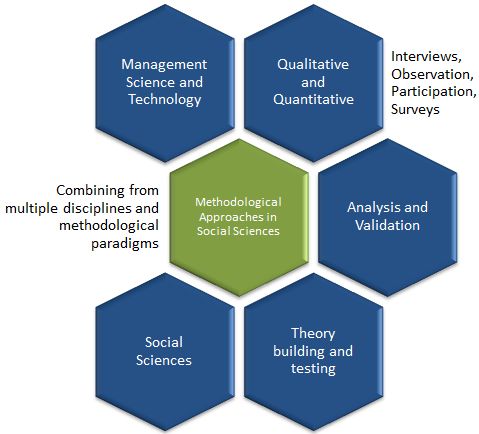The challenges of research design for social innovation: finding the right synergies from multiple disciplines
Research on social innovations draws from a range of disciplines that includes social policy, political sciences, economics, and sociology. Each discipline has its independent set of paradigms and associated controversies. While social innovations can be analyzed as drivers of change, they are also studied as outcomes of practices and institutions. The theoretical perspective of SI-DRIVE aims to advance existing research to combine and connect important discourses in social sciences, explicitly along the practice theories, network theories and theories of social change – focusing on social innovations from the micro, meso, and macro perspectives. This is the given background to facilitate the establishment of coherent methodologies to identify and promote social innovations.
The literature on social innovations is particularly limited, as well as the description of methodologies being used for research. Therefore our understanding of methods best suited, or most used in this field, is inhibited. Given the broad nature of the SI policy fields, and the fact that ICT is being considered as a cross cutting theme, SI-DRIVE wends for an approach that allows combining systematic literature review with the scanning of secondary data sources. The aim is to arrive at an integrated framework, covering various methological approaches including qualitative and quantitative methods, coming from different sciences, drawn from, or commonly used in Social Sciences as well as in the ICT and Management Sciences. It has been particularly challenging for the social scientists and experts from the ICT and Management Sciences to agree on a common methodological approach. Nevertheless, the nature of SI-DRIVE facilitates the coexistence of these fields to support the development of a common framework for empirical research that can be followed by not just the social science, ICT, and management science experts, but also by the wider stakeholder community across different policy fields.
From social sciences perspective, methods tend to be more exploratory. With social sciences, the concepts of theory building and theory testing become particularly complicated owing to the element of uncertainty in the theoretical concepts, absence of appropriate tools to measure those concepts, and the presence of probable factors capable of influencing such concepts. On the other hand, it has been commonly acknowledged that management sciences can neither be entirely formal nor be wholly empirical. A typical characteristic of management sciences research is the pre-calculated application of a scientific technique to solve a complex management problem. Essentially, the sociologists and economists focus interest in the historical validity of the data, but the management scientists are exclusively concerned with the future validity of their findings. Thus, management sciences are often found subjecting the positivist approach to considerable judgmental adulterations in the interest of remaining operational and meeting the set deadlines.
It is quite evident that social sciences are open to a variety of research approaches and statistical techniques involving qualitative and quantitative data, field surveys, case studies, interviews, and others. For qualitative, researchers are interested in understanding the interrelation of a phenomenon, whereas, quantitative researchers are keen on finding the explanations and options for controlling that phenomenon. On the other hand, mixed research synthesizes ideas from the qualitative and quantitative researches. Such approach not only opens avenues for newer ways of thinking by combining data from two exclusive sources, but also facilitates analysis that results in richer data. Given the intricate nature of social innovation, research in this field can be mostly inclined towards mixed research in drawing from a range of theories for building, analysing and understanding the frameworks of social innovation. That is exactly the approach of empirical research and analysis SI-DRIVE will benefit from.
Recommended Reading: Babbie, E. (2015). The practice of social research. Boston: Cengage Learning.
